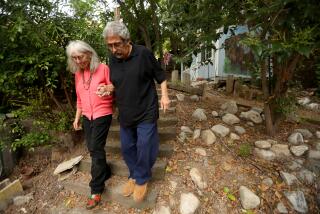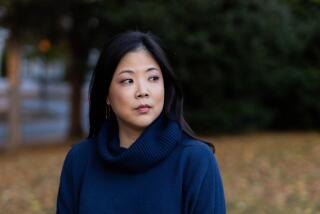Describes Alzheimer’s Disease : Grandson’s Touching Essay Wins Nationwide Contest
- Share via
“I was helping to set the table. My grandmother hovered like a pale, frail moth at my elbow. She gravitated toward my activity as a moth moves toward light, seeking brightness and warmth. . . . My grandma is a victim of Alzheimer’s.”
--John C. Gregg, in “Choices.”
One day in November, 17-year-old John C. Gregg, a senior at Eagle Rock High School, came home from afternoon classes and began jotting down thoughts about his 72-year-old grandmother.
It was a difficult topic, but John wrote dispassionately about his grandmother Val’s once-gracious demeanor, her fluency in five languages and, most recently, her painful and bewildering bout with Alzheimer’s disease.
Within several hours, he had the beginnings of an essay that eventually won him a $6,000 college scholarship and first place in Guideposts magazine’s annual youth writing contest. More than 4,000 students entered the nationwide contest. Guideposts was founded by the Rev. Norman Vincent Peale, author of “The Power of Positive Thinking.”
‘Sensitivity and Maturity’
Mary Ann O’Roark, the magazine’s senior editor, helped judge the contest. She said John’s essay displayed “sensitivity and maturity in dealing with what is such an incredibly difficult situation. . . . It showed the toll that Alzheimer’s takes on the entire family.”
Like many stories printed in the magazine, John’s story, told in the first person, used a dramatic, real-life narrative to address a moral or ethical issue. In John’s case, the subject was his grandmother’s debilitating illness, his aversion to her growing senility and how he came to terms with his feelings.
Titled “Choices,” it is long on descriptive detail, short on sentimentality and filled with the acute perception of a 17-year-old watching someone he loves wither away before his eyes.
“It just kind of hit me one day, her sense of humor and how she was really bright and alive,” John said in an interview. “That’s why it’s so hard to take now, because all you see now is an empty shell.”
Clad in blue jeans and a cable-knit sweater, the tall youth with steadfast blue eyes sat in his family’s living room recently and discussed his grandmother, who lives with her husband in the Northern California city of San Rafael.
He talked about her fear and shame at losing her memory, her embarrassment at speaking words that came out like gibberish and the haunted, pleading looks she would give him when she realized her mistakes.
“It puts a lot of pressure on you,” he said. “She says things to you in broken fragments and you have to act like it’s a normal situation. It’s like having a small child around.”
Alzheimer’s is a progressive form of dementia associated with degeneration of the brain. It usually starts in middle age. Between 2 million and 3 million Americans have the disease, and that number is expected to triple within 50 years unless a cure is found.
In the story, John imagined what his grandmother must suffer in her lucid moments.
“This must be the worst part, knowing with icy certainty what terrible thing is going to befall you and not being able to do anything about it,” John wrote.
After he finished the story, John read it to his grandfather, who takes care of his wife.
“He cried,” the teen-ager recalled. John also read the essay to his grandmother. He hopes she understood at least part of it.
The piece is called “Choices” because his grandmother’s have run out, but through her, an awareness of his own has just begun, John said.
Right now, the most important choice he faces is picking a college. He has applied to several, including Stanford University, Vassar College, Wesleyan University in Middletown, Conn., and Occidental, where his father is a chaplain.
“That’s the safe choice,” John joked.
He said he admires authors John Steinbeck and C. S. Lewis for their simple style and “subtle moral perspective.” When not in school, where his classes include advanced English and calculus, he is a member of Eagle Rock High’s swim team and is editor of the yearbook.
The eldest of three children, John said he doesn’t know what career he wants to pursue. He has considered joining the Peace Corps or becoming a scientist to help find a cure for Alzheimer’s.
As he said in the closing paragraph of his essay: “I am determined to make a difference in this world.”
More to Read
Sign up for our Book Club newsletter
Get the latest news, events and more from the Los Angeles Times Book Club, and help us get L.A. reading and talking.
You may occasionally receive promotional content from the Los Angeles Times.








